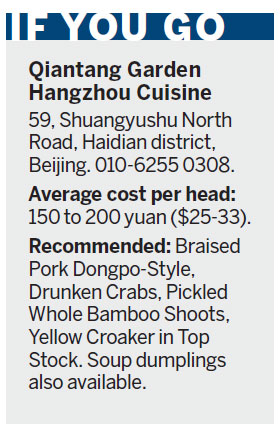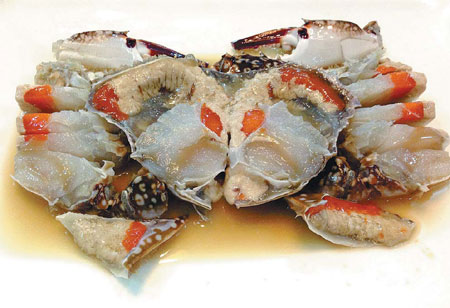Hangzhou's drunken cuisine
Updated: 2013-10-19 08:27
By Pauline D. Loh (China Daily)
|
|||||||||||
|
Now is the right season to enjoy drunken crabs at Qiantang Garden Hangzhou Cuisine in Beijing. Pauline D. Loh / China Daily |
Beijing is huge, and sometimes you can find delightful meals in the most unexpected places. Pauline D. Loh explores Haidian district and finds some choice southern offerings.
It was after a family wedding and the gathered clan had spent an exhilarating afternoon catching up on family gossip and helping our sister-in-law harvest her grapes. When it came time for dinner, we decided to eat local, quite literally. Haidian district is one of the fastest developing in Beijing, with a gathering of young technology start-ups, and the universities from which their bosses had come from. It has excellent malls selling all kinds of geek gadgets, and still enough room left over for tree-lined avenues full of 20-year-old residential estates.
With such a thriving demographic mix, it stands to reason that the dining options are just as lively.
The district is already known for its cafes and little coffee shops attracting a young clientele with free Wi-Fi and other 4G conveniences, but there are also excellent family-style restaurants here.
 |
Qiantang Garden serves Hangzhou food, but spreads its culinary style a little wider to cater for those homesick for Jiangsu-Zhejiang dishes. The owner is one of Beijing's largest suppliers of fish, prawns and crabs from these southern shores, and migrated here from Ningbo in Zhejiang province years ago. It was just natural for him to open a restaurant next.
The first thing you do when you enter is not to sit down and reach for the menu.
The truly experienced make their way down a corridor that opens up into a seafood display area complete with a wall of aquariums. Here, the best catch of the day is laid out neatly on the table, with labels to guide novices.
Our brother-in-law, a native Shanghainese, needs little prompting and fires off a volley of rapid-fire orders. We trot back to our dining room and sit down with anticipation.
First to arrive are the usual cold dishes of tossed toon shoots with the seasonal fresh walnuts, whole bamboo tips slightly pickled in salty-sweet brine, soy-braised duck tongues and the drunken snails or huangni luo.
Drunken prawns, drunken crabs and drunken snails are actually treated with yellow wine spiked with baijiu, or white spirits. The milder liqueur adds flavor while the stronger spirit neutralizes any stray bugs or germs that may lurk in the raw ingredients.
The drunken crabs here are very well done, and the season's best are all bursting with golden red roe. The translucent white flesh is juicy and gelatinous and sweet with wine and its natural flavors. At our table, even those who normally shy away from sashimi were reaching out for the crabs.
The prawns were another matter, however.
Only the truly brave will be rewarded with firm sweet flesh from the fat river prawns with long lanky claws. They were still twitching wildly when they reached the table, and had to be subdued with a bowl firmly clamped on top. But when it comes to fresh, nothing gets any better.
The secret is to wait until they are all "drunk" on the liquor and you know when that is when there are no more noises coming out from under the lid.
There is also a trick to peeling a prawn. Grasp it firmly by the neck and remove the head. Then, squeeze the base of the tail, and the whole prawn pops out into your mouth.
Those who fancy less primitive cuisine can enjoy the steamed and fried fishes, the most famous of which is the yellow river croaker, slightly salted for a day and then cooked in chicken broth or top stock.
This is a classic southern dish often mentioned in revolutionary author Lu Xun's books, especially in his classic tome about the fallen scholar Kong Yiji.
Hangzhou cuisine, or for that matter its surrounding relatives, place emphasis on fresh sea or river produce, and the seasonings are all lighter than strong northern preferences. You will never see a dish covered in sticky brown sauce, or heavily spiked with star anise or cumin.
The natural flavors of the ingredients are carefully nurtured on the plate, and that is why it is such an attractive culinary choice in these days of health and safety concerns.
At Qiantang Garden at least, you do not even have to worry about the source of the seafood. All you have to do is ask the boss, who have been buying from the same farmers and fishermen for the last 25 years.
Contact the writer at paulined@chinadaily.com.cn.
Today's Top News
No secret papers for Russia, says Snowden
China, EU move toward investment talks
Growth 'paves way for reforms'
Executives in Asia top the global pay league
Typhoon-ravaged city recovers from flooding
Mandatory student internships under fire
Shanghai to reduce PM2.5 20%
Workers' right to a rest stressed
Hot Topics
Lunar probe , China growth forecasts, Emission rules get tougher, China seen through 'colored lens', International board,
Editor's Picks

|

|

|

|

|

|






